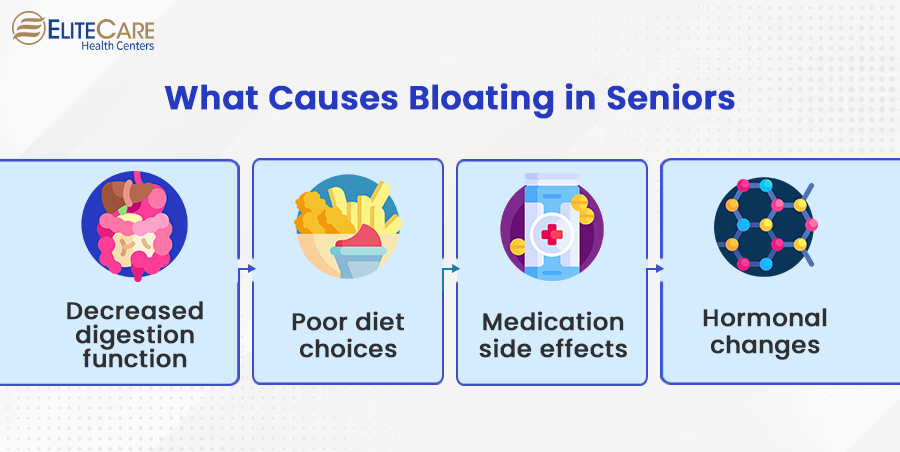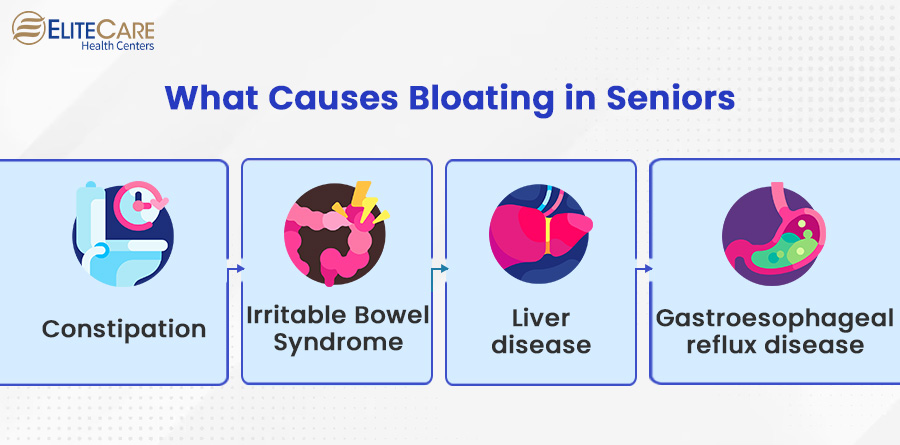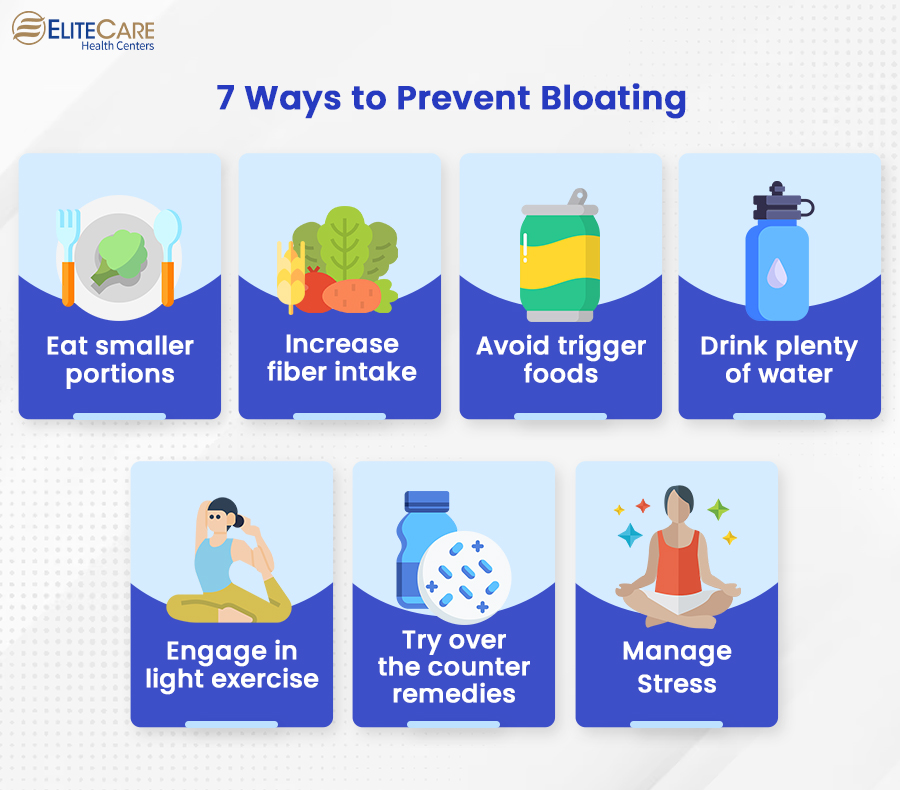
Bloating is a common digestive issue that can affect individuals of all age groups, but unfortunately, it gets a lot more common with age. A bloated stomach refers to feeling fullness and discomfort in the abdominal area due to excessive gas or fluid accumulation. While occasional bloating is usually harmless, persistent or severe bloating can significantly impact overall well-being.
Impact on Overall Wellness
The negative effects of a bloated stomach are as follows:
1. Physical Discomfort
Bloating can cause feelings of abdominal fullness, tightness, and discomfort. It can make individuals feel heavy and bloated and even affect their ability to move comfortably. This can significantly impact daily activities and diminish the overall quality of life.
2. Nutritional Implications
Prolonged bloating can affect eating habits and nutrient intake. It may cause reduced appetite, skipping meals, or avoiding nutritious foods out of fear of making bloating worse. This can result in inadequate nutrient absorption, leading to potential deficiencies and compromised overall health.
3. Impaired Digestion and Bowel Function
Normal digestion is disrupted because of bloating. It may lead to symptoms such as excessive gas, belching, indigestion, and heartburn. Digestive issues can impact nutrient absorption, cause irregular bowel movements (constipation or diarrhea), and affect gastrointestinal health.
4. Psychological Impact
Bloating can also have psychological effects. Feeling bloated or self-conscious about one’s appearance may lead to decreased self-esteem, body image issues, and social withdrawal. The emotional impact of bloating can affect individuals’ overall well-being and relationships.
Why is a Bloated Stomach Common in Seniors?
With age, the digestive system undergoes natural changes that can increase susceptibility to abdominal discomfort. Seniors may experience a variety of factors that lead to bloating, including reduced digestive enzyme production, slower digestion, changes in gut motility, and age-related medical conditions.
Understanding the causes of bloating and strategies to reduce it is essential to ensure seniors’ overall well-being and quality of life.
Causes of the Bloated Stomach in Seniors

1. Decreased Digestive Function
As seniors age, their digestive system undergoes natural changes. Reduced production of digestive enzymes and slower digestion can lead to incomplete breakdown of food, causing gas accumulation and bloating. Regular check-ups with primary care providers can help monitor digestive health and address concerns related to decreased digestive function.
2. Poor Diet Choices
Diet plays a significant role in digestive health. Seniors who consume a diet high in processed foods, refined carbohydrates, sugary drinks, and fatty or greasy foods are more prone to bloating. These foods are difficult to digest and can cause gas accumulation and a bloated stomach.
3. Medications
Seniors often take multiple medications to manage various health conditions. Some medications, such as certain pain relievers, antibiotics, and iron supplements, can contribute to bloating as a side effect. It is essential to consult primary care physicians to discuss potential medication contributing to bloating.
4. Hormonal Changes
Women in their senior years may experience hormonal fluctuations due to menopause or perimenopause. These hormonal changes can affect digestion and contribute to bloating.

Medical Conditions
a) Constipation: Seniors may experience constipation due to slower bowel movements or inadequate fiber intake. The accumulation of stool in the intestines can cause bloating and discomfort.
b) Irritable Bowel Syndrome (IBS): A chronic gastrointestinal disorder characterized by abdominal pain, bloating, and altered bowel habits. According to International Foundation for Gastrointestinal Disorders, 5-10% of the population worldwide has IBS. Most people with IBS are under the age of 50. But many older adults suffer as well. Seniors with IBS may experience bloating as a prominent symptom.
c) Liver Disease: Certain liver conditions, such as cirrhosis or fatty liver disease, can impair digestion and cause bloating in seniors.
d) Gastrointestinal Disorders: Other gastrointestinal disorders like inflammatory bowel disease (IBD) or gastroesophageal reflux disease (GERD) can contribute to bloating.
It is essential for seniors to consult their primary care physician or visit our medical clinic specializing in primary care to identify the underlying cause of bloating. A comprehensive evaluation, including medical history review, physical examination, dietary habits, medication review, and potentially additional diagnostic tests, can help determine the specific cause to develop a targeted treatment plan.
Ways to Reduce Bloated Stomach

1. Eat Smaller, More Frequent Meals
Instead of consuming large meals, seniors can benefit from eating smaller portions of well-balanced meals throughout the day. This helps prevent overeating and reduces the amount of food in the stomach at one time, making digestion easier and minimizing the likelihood of bloating.
2. Increase Fiber Intake
A fiber-rich diet promotes healthy digestion, regular bowel movements, prevents constipation, and reduces bloating. Seniors should incorporate fiber-rich foods such as fruits, vegetables, whole grains, and legumes. However, it’s important to increase fiber intake gradually to allow the body to adjust and minimize potential discomfort.
3. Avoid Gas-Producing Foods
Seniors should avoid or limit their consumption of gas-producing foods such as beans, lentils, cruciferous vegetables (like broccoli and cauliflower), carbonated beverages, and certain fruits like apples and pears. Each individual may have specific trigger foods, so it’s essential to identify and avoid them accordingly.
4. Drink Plenty of Water
Adequate hydration is essential for maintaining regular bowel movements and preventing constipation, which can contribute to bloating. Seniors should aim to drink enough water throughout the day, typically around 6 to 8 glasses of water or more, unless otherwise advised by their primary care physician.
5. Engage in Light Exercise
Exercise stimulates intestinal contractions, promoting regular bowel movements and relieving bloating. Regular physical activity such as walking or gentle yoga can help with a bloated stomach. Seniors should consult with their primary care physician before starting any exercise regimen, especially if they have underlying health conditions.
6. Try Over-the-Counter Remedies
Over-the-counter remedies like probiotics and digestive enzymes may help improve digestion and reduce bloating. Probiotics help maintain a healthy gut microbiome, while digestive enzymes can aid in the breakdown of food, supporting digestion and reducing bloating. Seniors should consult their primary care physician or a pharmacist for appropriate over-the-counter options.
7. Stress Management Techniques
According to a study, stress can affect digestion and the nutrients the intestines absorb. Seniors should practice stress management techniques such as deep breathing exercises, meditation, or engaging in activities they enjoy to help alleviate stress and improve digestion and minimize bloating.
Seniors need to implement these strategies gradually and observe their body’s response. If bloating persists or worsens, consulting a healthcare professional is recommended for further evaluation and personalized advice.
When To See a Doctor
1. Severe and Persistent Bloating
If the bloating is severe and lasts for an extended period, it is important to consult a doctor. Persistent bloating could indicate an underlying medical condition that requires evaluation and appropriate management.
2. Accompanied by Other Symptoms
If bloating is accompanied by symptoms like severe abdominal pain, fever, vomiting, blood in the stool, or difficulty swallowing, it is crucial to seek medical care promptly.
3. Sudden Onset
If bloating occurs suddenly and intensely, it may cause concern. Sudden onset bloating, especially if accompanied by other symptoms, can be a sign of a medical emergency, such as bowel obstruction or intestinal perforation. Immediate medical attention is crucial in such cases.
4. Unexplained Weight Loss
When weight loss occurs without a deliberate cause, it can serve as a red flag indicating an underlying health problem. Gastrointestinal issues or malignancies are among the potential causes, and it is crucial to seek proper assessment by a healthcare professional.
In any of these situations, visiting a medical clinic or scheduling an appointment with a primary care physician is advisable.
To Sum Up
Addressing abdominal bloating and its underlying causes is vital to improving overall well-being. Individuals can reduce the occurrence and severity of bloating by making specific lifestyle changes. In addition to lifestyle modifications, seeking medical care when necessary is crucial. Elite Care Health Center’s primary care physicians can provide personalized guidance, treatment options, and referrals to specialists if needed. Prioritizing digestive health is key to ensuring that one can enjoy a comfortable and fulfilling lifestyle.






